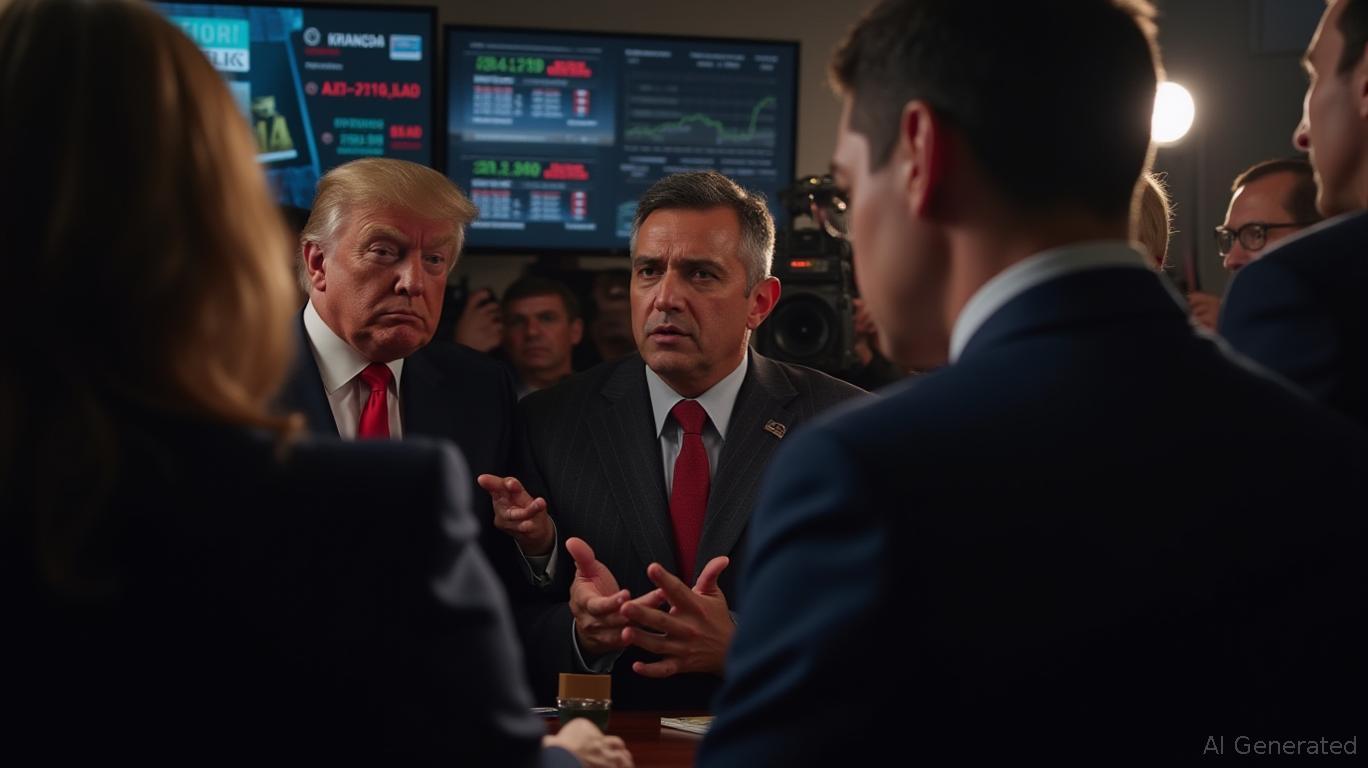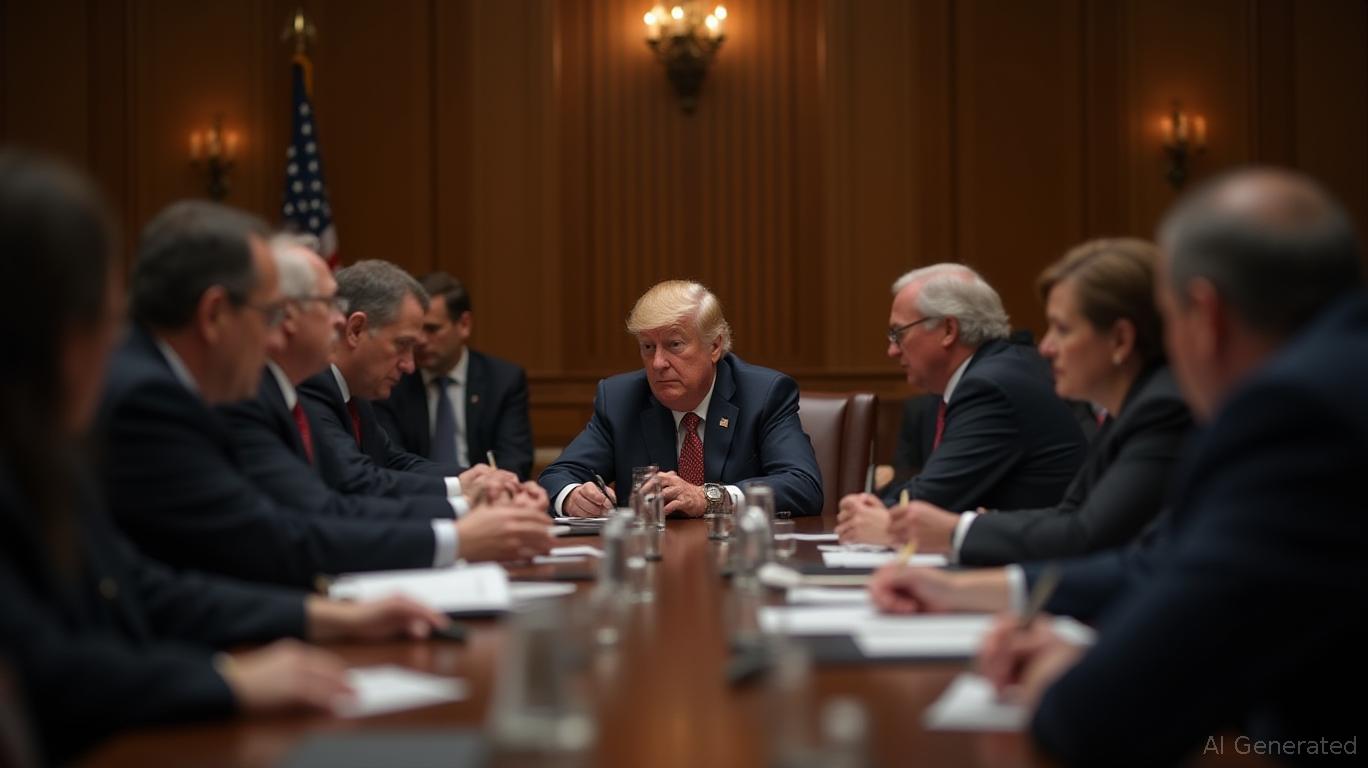Trump's Crypto Pardon Sparks Firestorm as Khanna Pushes for Trading Ban
- Rep. Ro Khanna (D-Calif.) proposes banning Trump, family, and Congress from crypto trading to address alleged "unprecedented" corruption, citing World Liberty Financial ties. - Trump's controversial pardon of Binance founder CZ Zhao, a foreign national convicted of U.S. money laundering violations, sparks bipartisan criticism and legal scrutiny. - Binance's $740,000 lobbying efforts in Washington, including payments to Trump-linked operatives, raise questions about the pardon's motivations and regulatory
Representative Ro Khanna (D-Calif.) has delivered a sharp rebuke of President Donald Trump’s involvement with cryptocurrency, accusing his administration of engaging in “unprecedented” self-enrichment and promising to propose a resolution that would bar the president, his relatives, and members of Congress from trading cryptocurrencies or accepting foreign funds, as reported by
Khanna, who has long criticized Trump’s financial conduct, accused the president of leveraging his position for “excessive” personal gain, pointing to Zhao’s investment in the Trump-endorsed stablecoin

During a press briefing, Trump justified his decision to pardon Zhao, stating he was told Zhao’s actions “did not even constitute a crime” and that the previous administration had “targeted” him, according to Cointelegraph. The pardon has ignited a political uproar, with Democratic figures such as Senator Elizabeth Warren (D-Mass.) denouncing it as favoritism. Meanwhile, Binance’s lobbying activities in Washington—including $450,000 paid to individuals linked to Trump and $290,000 to former SEC candidate Teresa Goody Guillén—have raised suspicions about the reasons behind the pardon, as detailed in a
This controversy highlights deeper disputes within the cryptocurrency industry. While Trump’s executive order to position the U.S. as a “crypto capital” has been welcomed by industry leaders like CZ, who vowed to “generate significant wealth for the nation,” critics argue that the pardon sets a precedent for leniency toward regulatory offenders, Cointelegraph noted. Legal experts also point out that a presidential pardon does not erase Zhao’s conviction, leaving his criminal record and potential civil liabilities intact, according to a
Khanna’s proposed resolution reflects increasing demands for openness in cryptocurrency policy. Having previously supported Bitcoin as a strategic reserve, the congressman described the ban as essential to avoid conflicts of interest, Benzinga reported. His office also emphasized USD1’s involvement in a $2 billion transaction between Abu Dhabi’s MGX and Binance earlier this year, further complicating the Trump family’s claims of financial independence, according to Benzinga.
The White House has not issued a statement regarding the resolution, while Binance expressed gratitude to Trump for “his leadership” in promoting cryptocurrency adoption. As debate over crypto regulation grows more heated, Khanna’s proposal marks a possible shift in congressional oversight, with Democrats using the issue to spotlight what they call Trump’s “damaging” financial behavior, Benzinga reported.
Disclaimer: The content of this article solely reflects the author's opinion and does not represent the platform in any capacity. This article is not intended to serve as a reference for making investment decisions.
You may also like
BNB News Update: Clearer Regulations Boost Altcoin Confidence as Major Institutions Invest Billions
- Trump's pardon of Binance founder Zhao sparks 3.6% BNB surge to $1,121, signaling potential altcoin supercycle amid regulatory clarity and institutional adoption. - BNB's Coinbase/Rollinhood listing and $5.3M BNB acquisition by Applied DNA highlight growing institutional confidence in altcoin yields and market accessibility. - Upcoming Fed rate cuts and ETF approvals could accelerate crypto adoption, though Bitcoin's 60% dominance may temporarily cap altcoin gains. - Market infrastructure expansion (IBM'

Bipartisan Crypto Legislation Nearly Complete, Senate Disagreements on DeFi Postpone Final Decisions
- Coinbase CEO Brian Armstrong claims U.S. crypto legislation enjoys 90% bipartisan support, with key bills like CLARITY Act nearing Senate approval by year-end. - Political tensions persist over DeFi regulation and stablecoin oversight, with Senate deadlines looming and Trump-backed crypto projects facing scrutiny from Warren and Tillis. - Coinbase partners with Citi to expand stablecoin-driven institutional payments, aiming to modernize global finance through cross-border digital asset solutions. - Stabl

DeFi Faces a Major Challenge: dYdX Suggests $462K Payout Following Oracle Disruption
- dYdX proposes $462,000 compensation from its insurance fund for traders impacted by a 10 October chain outage caused by oracle and validator failures. - The outage triggered $19B in liquidations, exposing DeFi vulnerabilities in oracle dependencies and validator coordination during high-volatility periods. - Binance separately offered $728M in relief measures for affected traders, emphasizing market stability without accepting liability for losses. - Experts highlight 20-30% amplified losses during outag

Hong Kong's $4 Billion Bond Boom and $1.59 Billion Equity Influx Reinforce Its Status as a Leading International Financial Hub
- China's Ministry of Finance issues $4B USD-denominated sovereign bonds in Hong Kong, boosting offshore liquidity and yield curve reliability for global investors. - Sany Heavy Industry raises $1.59B via Hong Kong listing, contributing to a 3x surge in year-to-date capital raisings ($23B) as firms leverage relaxed cross-border investment rules. - Hong Kong's dual role as China's offshore capital gateway is reinforced through sovereign bond sales and corporate listings, signaling confidence in attracting f
